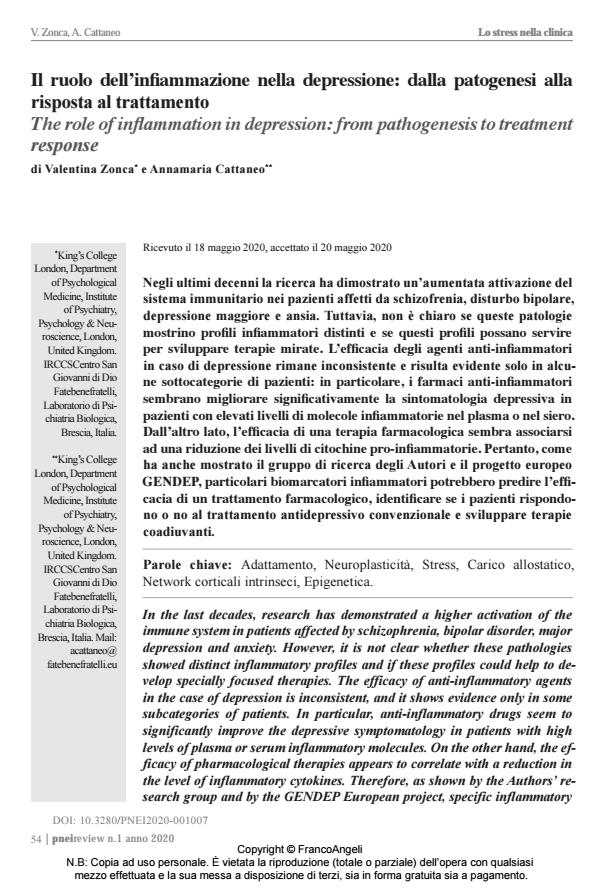The role of inflammation in depression: from pathogenesis to treatment response
Journal title PNEI REVIEW
Author/s Valentina Zonca, Annamaria Cattaneo
Publishing Year 2020 Issue 2020/1 Language Italian
Pages 7 P. 54-60 File size 132 KB
DOI 10.3280/PNEI2020-001007
DOI is like a bar code for intellectual property: to have more infomation
click here
Below, you can see the article first page
If you want to buy this article in PDF format, you can do it, following the instructions to buy download credits

FrancoAngeli is member of Publishers International Linking Association, Inc (PILA), a not-for-profit association which run the CrossRef service enabling links to and from online scholarly content.
In the last decades, research has demonstrated a higher activation of the immune system in patients affected by schizophrenia, bipolar disorder, major depression and anxiety. However, it is not clear whether these pathologies showed distinct inflammatory profiles and if these profiles could help to develop specially focused therapies. The efficacy of anti-inflammatory agents in the case of depression is inconsistent, and it shows evidence only in some subcategories of patients. In particular, anti-inflammatory drugs seem to significantly improve the depressive symptomatology in patients with high levels of plasma or serum inflammatory molecules. On the other hand, the efficacy of pharmacological therapies appears to correlate with a reduction in the level of inflammatory cytokines. Therefore, as shown by the Authors’ research group and by the GENDEP European project, specific inflammatory biomarkers could help to predict the efficacy of pharmacological therapies, identify whether patients will respond or not to the conventional treatment for depression and develop adjuvant therapies.
Keywords: Inflammation, Depression, Serotonin, Biomarkers, Psychiatry, Treatment- resistant depression.
- Capuron L. and Miller A.H. (2004). Cytokines and psychopathology: lessons from interferon-alpha. Biol. Psychiatry, 56(11): 819-824.
- Fujigaki H., Saito K., Fujigaki S., Takemura M., Sudo K., Ishiguro H. and Seishima M. (2006). The signal transducer and activator of transcription 1alpha and interferon regulatory factor 1 are not essential for the induction of indoleamine 2,3-dioxygenase by lipopolysaccharide: involvement of p38 mitogen-activated protein kinase and nuclear factor-kappaB pathways, and synergistic effect of several proinflammatory cytokines. J. Biochem., 139(4): 655-662.
- Gadad B.S., Jha M.K., Czysz A., Furman J.L., Mayes T.L., Emslie M.P. and Trivedi M.H. (2018). Peripheral biomarkers of major depression and antidepressant treatment response: Current knowledge and future outlooks. J. Affect. Disord., 233: 3-14.
- Haroon E., Daguanno A.W., Woolwine B.J., Goldsmith D.R., Baer W.M., Wommack E.C., Felger J.C. and Miller A.H. (2018). Antidepressant treatment resistance is associated with increased inflammatory markers in patients with major depressive disorder. Psychoneuroendocrinology, 95: 43-49.
- Kohler C.A., Freitas T.H., Maes M., de Andrade N.Q., Liu C.S., Fernandes B.S., Stubbs B., Solmi M., Veronese N., Herrmann N., Raison C.L., Miller B.J., Lanctot K.L. and Carvalho A.F. (2017). Peripheral cytokine and chemokine alterations in depression: a meta-analysis of 82 studies. Acta Psychiatr. Scand., 135(5): 373-387.
- Kohler C.A., Freitas T.H., Stubbs B., Maes M., Solmi M., Veronese N., de Andrade N.Q., Morris G., Fernandes B.S., Brunoni A.R., Herrmann N., Raison C.L., Miller B.J., Lanctot K.L. and Carvalho A.F. (2018). Peripheral Alterations in Cytokine and Chem okine Levels After Antidepressant Drug Treatment for Major Depressive Disorder: Systematic Review and Meta-Analysis. Mol. Neurobiol., 55(5): 4195-4206.
- Liu J.J., Wei Y.B., Strawbridge R., Bao Y., Chang S., Shi L., Que J., Gadad B.S., Trivedi M.H., Kelsoe J.R. and Lu L. (2020). Peripheral cytokine levels and response to antidepressant treatment in depression: a systematic review and meta-analysis. Mol. Psychiatry, 25(2): 339-350.
- Raison C.L., Capuron L. and Miller A.H. (2006). Cytokines sing the blues: inflammation and the pathogenesis of depression. Trends Immunol., 27(1): 24-31.
- Roman M. and Irwin M.R. (2020). Novel neuroimmunologic therapeutics in depression: A clinical perspective on what we know so far. Brain Behav. Immun., 83: 7-21.
- Uher R., Tansey K.E., Dew T., Maier W., Mors O., Hauser J., Dernovsek M.Z., Henigsberg N., Souery D., Farmer A. and McGuffin P. (2014). An inflammatory biomarker as a differential predictor of outcome of depression treatment with escitalopram and nortriptyline. Am. J. Psychiatry, 171(12): 1278-1286.
Valentina Zonca, Annamaria Cattaneo, Il ruolo dell’infiammazione nella depressione: dalla patogenesi alla risposta al trattamento in "PNEI REVIEW" 1/2020, pp 54-60, DOI: 10.3280/PNEI2020-001007